Syria crisis: David Cameron makes case for military action
- Published
- comments
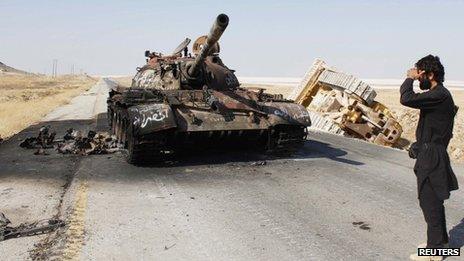
The fighting between rebels and pro-government forces continues in Syria
Prime Minister David Cameron has put his case for military action against Syria to British MPs, but has conceded intelligence that the regime used chemical weapons is not "100% certain".
He told an emergency debate that UK intelligence chiefs believed it "highly likely" the Syrian government was responsible for the 21 August attack.
But he said MPs must make a judgement call ahead of a Commons vote.
The UK could launch strikes without UN backing, according to legal advice.
Action would be a legal "humanitarian intervention" - even if it was vetoed at the UN, the government's summary, external of the advice said.
Mr Cameron told MPs - who have been recalled early from their summer recess - he was convinced it was "beyond doubt" Syrian President Bashar al-Assad's regime was behind the attack.
But he added: "In the end there is no 100% certainty about who is responsible."
Mr Cameron also stressed that unless action was taken Damascus would conclude it could use such weapons again and again.
UK opposition leader Ed Miliband said Labour was not ruling out military intervention but insisted there had to be a clear road-map to a decision.
Meanwhile, the five permanent members of the UN Security Council met to discuss the crisis. Two of them, Russia and China, have blocked previous resolutions on the issue and analysts predict they will again.
Russia - Syria's main international ally - called the meeting, which has now ended with no progress towards a consensus, the BBC understands.
Deter future attacks
The Syrian government has denied it is behind the suspected chemical attack near Damascus last week, in which hundreds of people are reported to have died, blaming opposition forces.
US President Barack Obama has said he has not yet decided on a plan for action against Syria, but the White House has said any response will be based on US national security interests.
The White House is due to give senior US Congress members a classified briefing on why it is certain Syria has used chemical weapons.
Other nations are also considering the next move.
UN Secretary General Ban Ki-moon has called for patience and insists he will receive a report on Saturday from weapons inspectors investigating the attack.
Downing Street has said parliament could be recalled again over the weekend if the inspectors' assessment is published.
A spokesman added the government believed there was a case for "surgical strikes" but that the Commons debate was not about "going to war".
Syrian President Bashar al-Assad has said his country will defend itself against any aggression.
The UK wants a UN Security Council resolution to take "all necessary measures" to help civilians, and presented a draft resolution to members on Wednesday.
However, Downing Street has since released a statement, based on formal legal advice by the attorney general Dominic Grieve, that states limited military strikes to deter future chemical weapons attacks would be in line with international law.
An assessment published by the Joint Intelligence Committee also argued it was "not possible for the opposition to have carried out a chemical weapons attack on this scale".
In its report, chairman Jon Day said it was "highly likely" the Assad regime was responsible.
Opening Thursday's Commons debate, Mr Cameron said: "It's not about taking sides in the conflict, it's not about invading, it's not about regime change or indeed working more closely with the opposition.
"It's about the large-scale use of chemical weapons and our response to a war crime - nothing else."
David Cameron: "This is not like Iraq"
However, he warned MPs it was up to them to make a judgement, saying: "Let's not pretend there is one smoking piece of intelligence that can solve the whole problem."
He also said he was "deeply mindful" of past conflicts - in particular "what went wrong with the Iraq conflict".
"But this is not like Iraq," he insisted. "What we are seeing in Syria is fundamentally different."
The UK Parliament is due to vote on whether to back the principle of military intervention. But Mr Miliband has said MPs should not have to decide on what he called an "artificial timetable".
Speaking during the Commons debate, he insisted any military action should be based on the principle that "evidence should precede decision; not decision precede evidence".
"I do not rule out supporting the prime minister," Mr Miliband said. "But I believe he has to make a better case than he did today on this question."
In other developments:
Six RAF Typhoon jets have been deployed to Cyprus as a "prudent and precautionary measure" to protect the UK airbase at Akrotiri.
UN Secretary General Ban Ki-Moon says he expects to receive the weapons inspectors' report by the weekend
Protesters gathered outside Downing Street to protest against Western intervention in the Syrian civil war, with some 5,000 people expected to demonstrate on Saturday
The Archbishop of Canterbury, Justin Welby, said he was yet to be convinced intervention would prevent future chemical weapons use
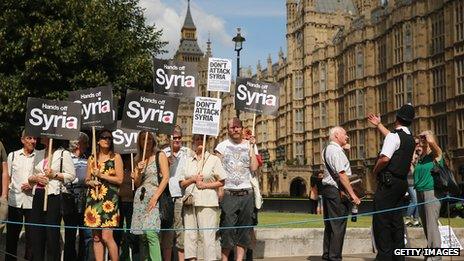
Anti-war protesters gathered outside Parliament ahead of the debate
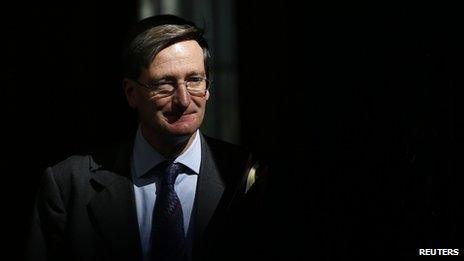
The government's summary of Attorney General Dominic Grieve's legal advice says unilateral UK action would be permissible on humanitarian grounds
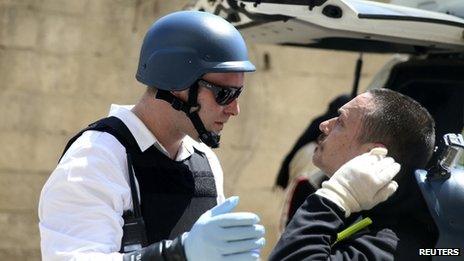
UN chemical weapons experts have been working with the Free Syrian Army
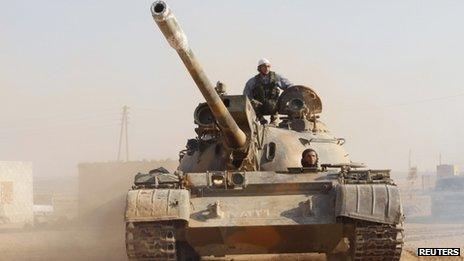
Meanwhile, fighting in Syria continued - the Free Syrian Army here seized a pro-government forces tank
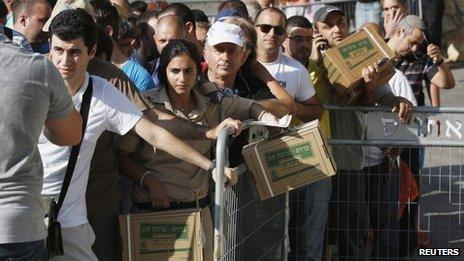
People have been queuing for gas masks in neighbouring Israel amid expectations of a strike by the US military
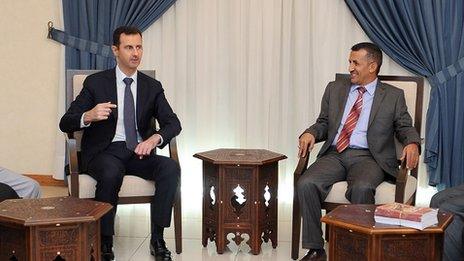
Syrian President Bashar al-Assad, pictured here meeting a Yemeni delegate in Damascus, said his country would defend itself against any aggression
The Speaker of the Syrian parliament has written to his counterpart in London inviting a British parliamentary delegation to visit Damascus as soon as possible.
French President Francois Hollande has also yet to decide about a military intervention. But on Thursday, after meeting Ahmed Jarba, the head of the opposition Syrian National Coalition, Mr Hollande said a political solution would only be possible if "the international community can put a temporary stop to this escalation in violence".
Elsewhere, a Chinese state-run newspaper has warned Western governments that there are no excuses for air strikes on Syria before the UN has completed its investigation.
And Russia, President Assad's main international ally, also says it opposes any foreign military intervention in Syria.
But in the event of any military action, BBC defence correspondent Caroline Wyatt said cruise missiles could be launched from US ships in the Gulf or the Mediterranean, or Royal Navy vessels including submarine HMS Tireless.
Forces which could be used against Syria
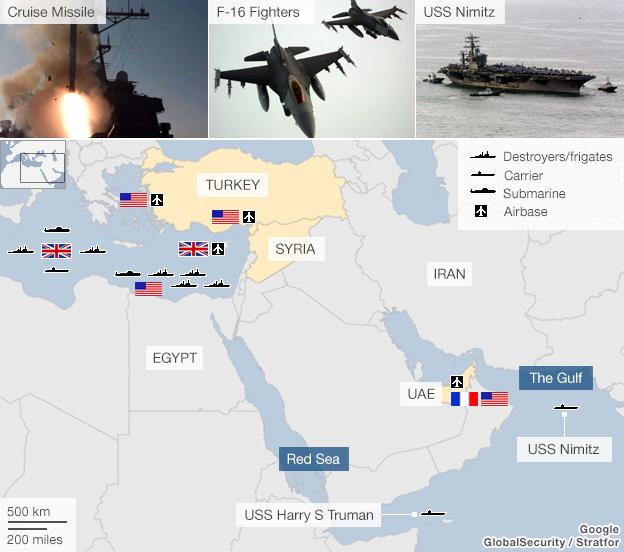
Four US destroyers - USS Gravely, USS Ramage, USS Barry and USS Mahan are in the eastern Mediterranean, equipped with cruise missiles
Cruise missiles could also be launched from submarines, including a British Trafalgar class boat; HMS Tireless was reportedly sighted in Gibraltar at the weekend
Airbases at Incirlik and Izmir in Turkey, and in Jordan, could be used to carry out strikes
Two aircraft carriers - USS Nimitz and USS Harry S Truman, along with escort ships, are in the wider region
The Royal Navy's response force task group - which includes helicopter carrier HMS Illustrious and frigates HMS Montrose and HMS Westminster - is in the region on a scheduled deployment
RAF Akrotiri airbase in Cyprus could also be used
French aircraft carrier Charles de Gaulle is currently in Toulon in the western Mediterranean
French Raffale and Mirage aircraft can also operate from Al-Dhahra airbase in the UAE